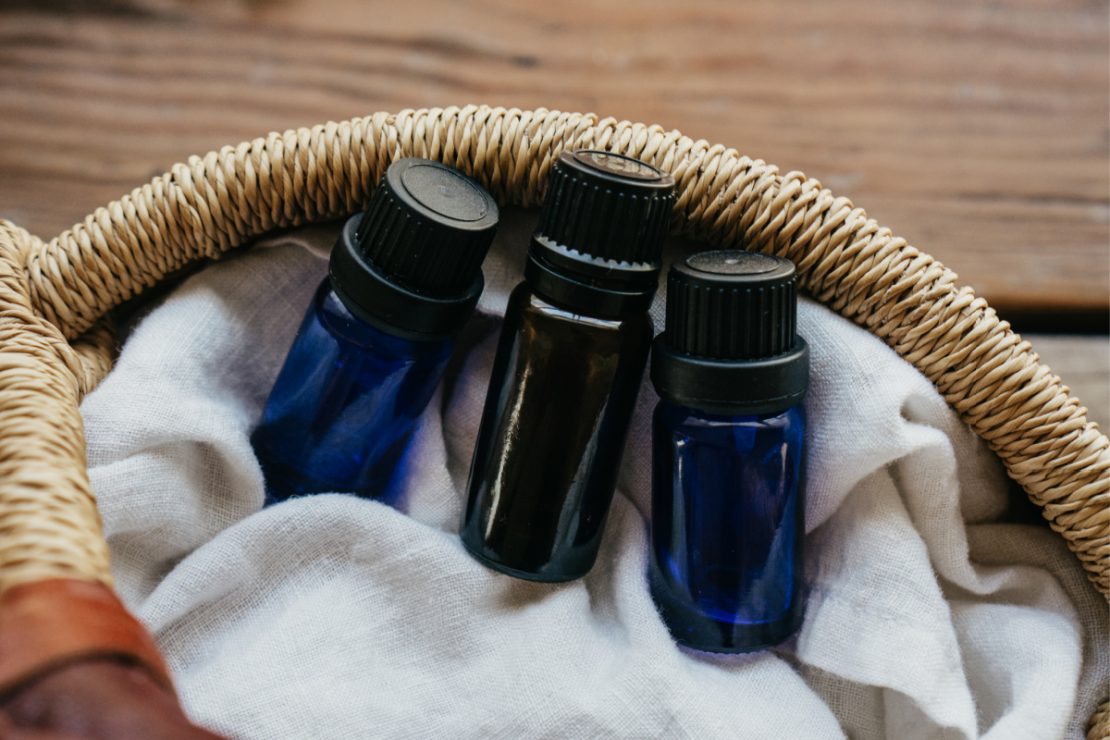
Essential Oils in Pregnancy
What makes an essential oil safe to use during pregnancy? Essential oils are potent extractions of the most volatile components found in plant matter. Thus, each botanical species should be carefully considered before use. Further, essential oils should be more heavily diluted for use during this time—one important aspect of safe essential oils for pregnancy.
Plants containing certain strong chemical constituents should be avoided during pregnancy and lactation. Not all essential oils and pregnant people mix!
Some experts say the main concern with using lipophilic substances like essential oils during pregnancy is exposing the fetus via absorption into the placenta. For this reason, many doctors advise not using essential oils during the first trimester of pregnancy.
After the first trimester, certain essential oils can be used topically during pregnancy. Properly diluted, exposure to the fetus does not necessarily mean a risk of toxicity (Tisserand & Balacs, 1995). In fact, aromatherapy expert Jane Buckle says that essential oils have been used safely countless times during pregnancy in the form of perfume and bath products (Buckle, 2003).
In this article, any use of essential oils refers to inhalation or topical use. Those who are pregnant should not use essential oils internally.
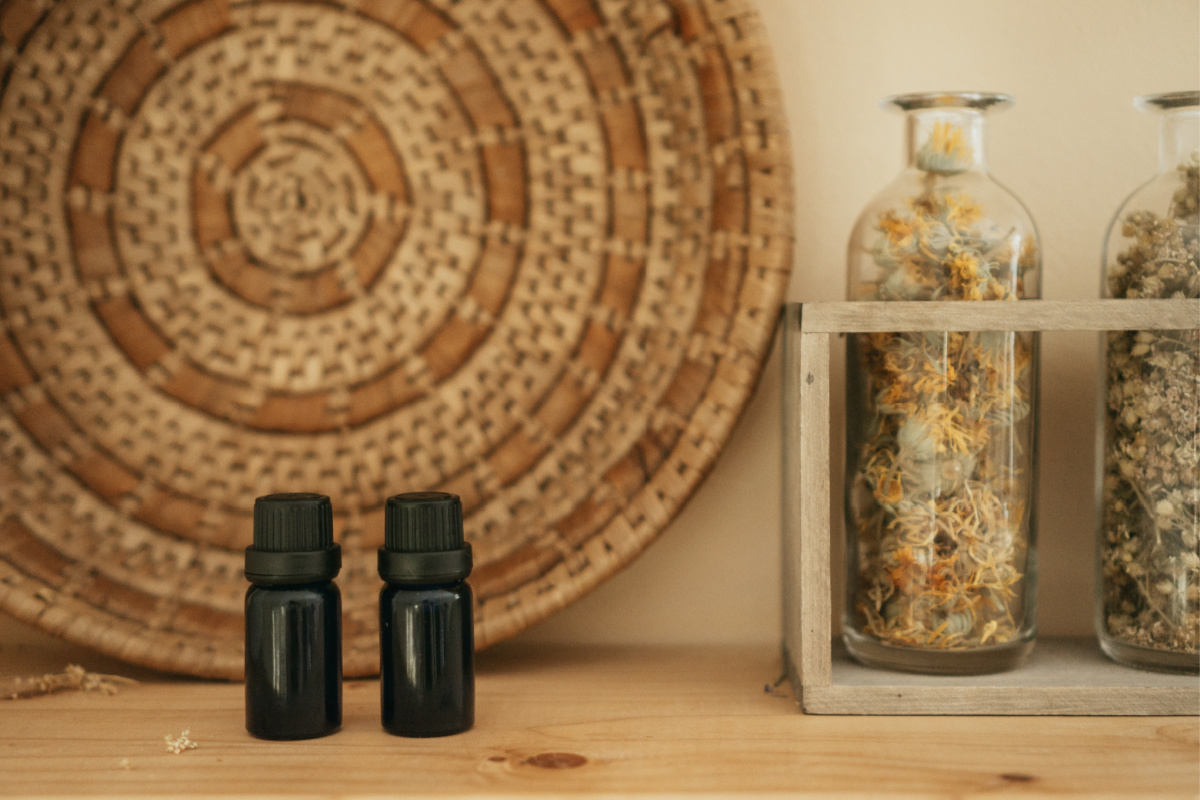
What Essential Oils Are Safe to Use After the First Trimester?
Used in moderation, many essential oils are generally safe during pregnancy. Dilution is important. While professional aromatherapists suggest diluting most essential oils to 2% for general use, it is suggested that essential oils should be diluted to 1% or less if used during pregnancy (Christie et al., 2013).
Plus, unique medical conditions should be considered before use. Ask your doctor if you have questions about using essential oils safely.
Here is a list of some essential oils to enjoy after the first trimester.
Gentle Essential Oils
- Bergamot FCF (furocoumarin free) (Citrus bergamia)
- Black Pepper (Piper nigrum)
- Cedarwood, red (Juniperus virginiana)
- Chamomile, German (Chamomilla recutita)
- Chamomile, Roman (Anthemis nobilis)
- Cypress (Cupressus sempervirens)
- Rose geranium (Pelargonium graveolens)
- Ginger (Zingiber officinale)
- Helichrysum (Helichrysum angustifolium)
- Juniper (Juniperus communis)
- Lavender (Lavandula angustifolia)
- Mandarin (Citrus reticulata)
- Petitgrain (Citrus aurantium var. amara)
- Pine (Pinus sylvestris)
- Rose (Rosa damascene)
- Sweet Orange (Citrus sinensis)
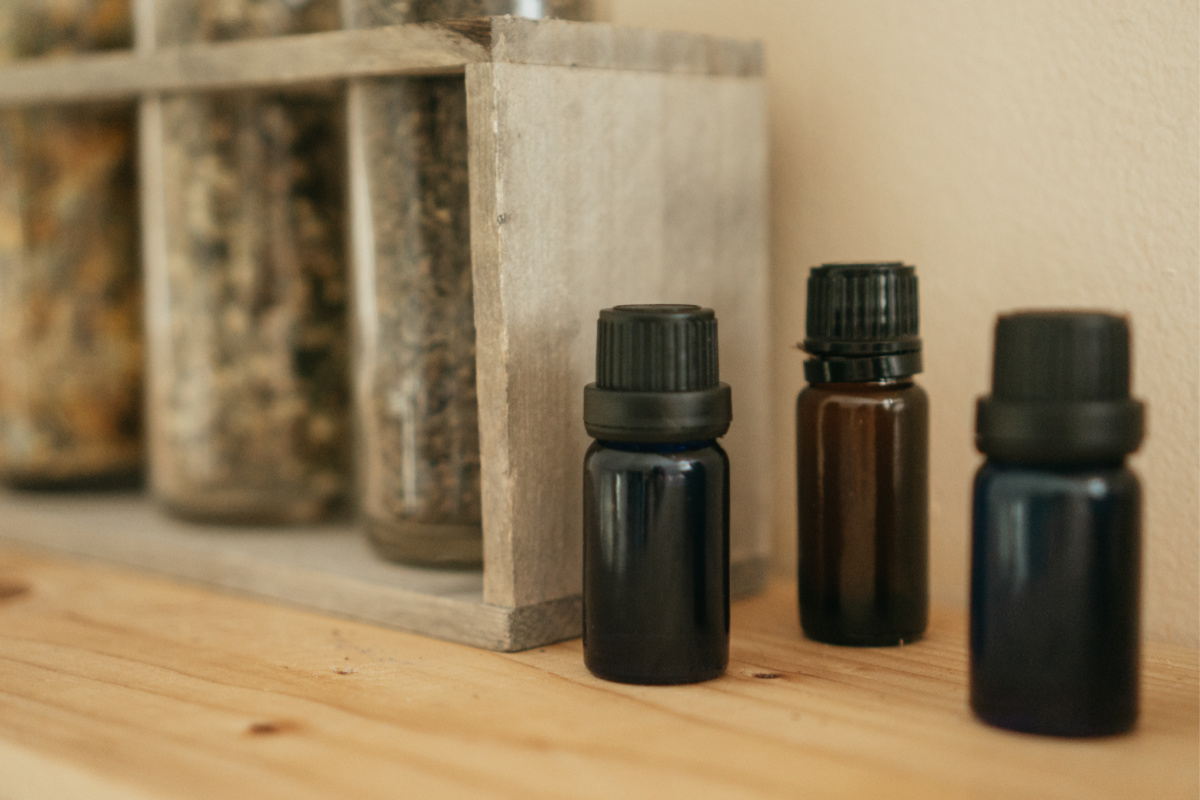
Are There Certain Essential Oils That Should Be Avoided During Pregnancy?
A pregnant individual may expose the baby to essential oils even when using via inhalation or topically. While the internal use of essential oils is not advised, absorption can still occur when using diffusers or skin-care products.
Some chemical components found in certain essential oils, such as phenol constituents, are too strong and risk the safety of baby and mom. Other essential oils may contain constituents with a potential estrogenic effect. Below is a list of some essential oils to avoid during pregnancy (Christie at al., 2013 & NAHA, 2021).
Avoid These Essential Oils During Pregnancy
- Aniseed (Pimpinella anisum)
- Basil CT estragol (Ocimum basilicum)
- Bay (Pimento racemosa)
- Camphor (Cinnamomum camphora)
- Cassia (Cinnamomum cassia)
- Cinnamon (Cinnamomum zeylanicum)
- Clary Sage (Salvia sclarea)
- Clove (Syzgium aromaticum)
- Cumin (Cuminum cyminum)kc
- Hyssop (Hyssopus officinalis)
- Mugwort (Artemisia vulgaris)
- Oregano (Origanum vulgare)
- Parsley (Petroselinum sativum)
- Pennyroyal (Mentha pulegium)
- Sage (Salvia officinalis)
- Sweet Birch (Betula lenta)
- Tansy (Tanacetum vulgare)
- Tarragon (Artemisia dracunculus)
- Thuja (Thuja occidentalis)
- Thyme (Thymus vulgaris CT thymol)
- Wintergreen (Gaultheria procumbens)
- Wormwood (Artemisia absinthium)
Please note: This is not an all-encompassing list, and there may be additional essential oils to avoid. Contact your doctor if you have any questions before use.
A Strong Sense of Smell
It is important to consider that many pregnant individuals notice a heightened sense of smell during their first trimester of pregnancy. Hyperosmia, or increased olfactory sensitivity, might be a special ability given to help those expecting to protect their growing baby from dangerously strong chemicals found naturally or synthetically. Research has suggested that this especially acute perception of odor is most sensitive during the first trimester of pregnancy (Cameron, 2014).
Here is a list of some essential oils with strong aromas that one may want to avoid:
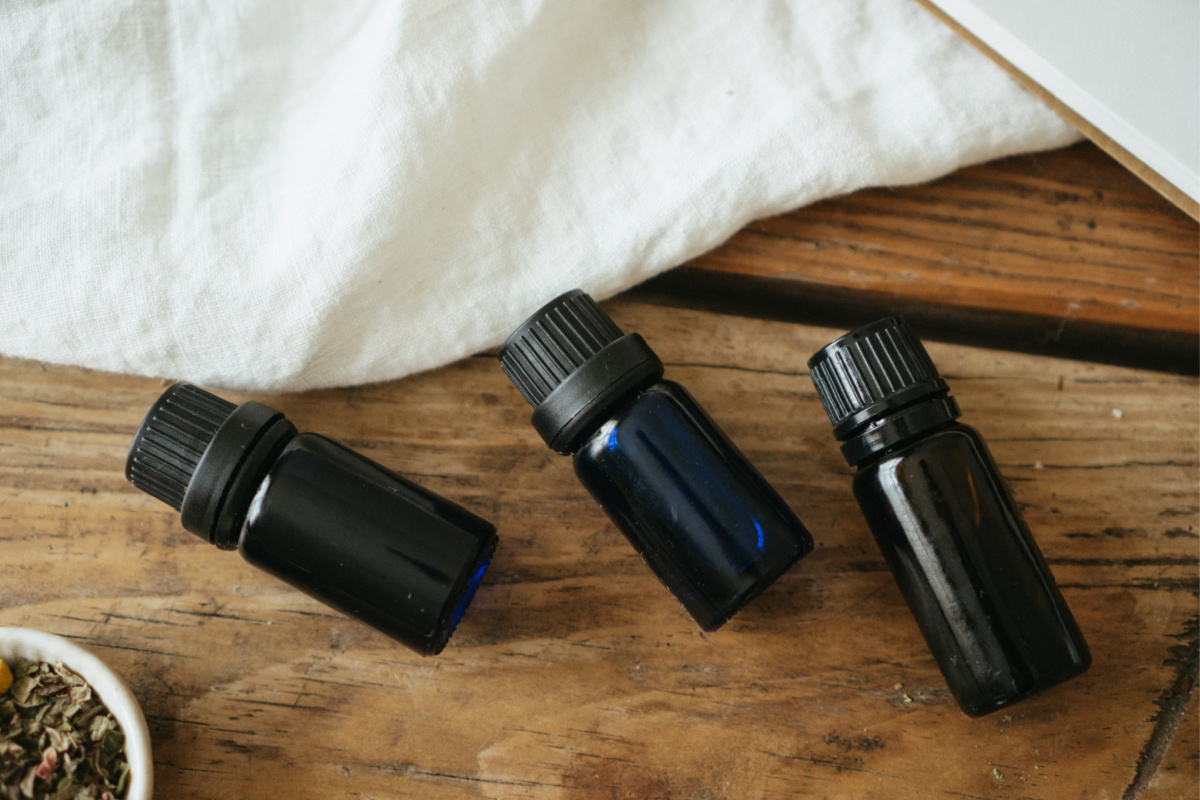
Essential Oils with Strong Aromas to Avoid In Pregnancy
- Eucalyptus (Eucalyptus globulus)
- Jasmine (Jasminum officinale, J. sambac, or J. grandiflorum)
- Lemon, expressed (Citrus limon)
- Lemongrass (Cymbopogan citratus)
- Peppermint (Mentha x piperita)
- Rosemary (Salvia Rosmarinus)
- Sandalwood (Santalum album)
- Vanilla (Vanilla planifolia)
- Ylang ylang (Cananga odorata)
Sensitive Skin
Another thing to know is that a pregnant person’s skin is more delicate while pregnant. In fact, more than 90% of those who are pregnant experience significant skin changes. During pregnancy, the body undergoes major endocrine, immunologic, metabolic, and vascular modifications that can affect the skin (Vora et al., 2014).
This can include increased photosensitivity and a propensity to burn more easily. Here is a list of additional essential oils to avoid topically with sun exposure or sensitive skin (NAHA, 2021). Please also avoid the topical use of essential oils from the first list in this article entitled: Avoid These Essential Oils During Pregnancy.
Avoid Topically
- Angelica root (Angelica archangelica)
- Bergamot that is not FCF – furocoumarin free (Citrus bergamia)
- Bitter orange, expressed (Citrus aurantium)
- Grapefruit, distilled or expressed (Citrus paradisi)
- Lemon verbena (Lippia citriodora)
- Lemon, expressed (Citrus limon)
- Lemongrass (Cymbopogan citratus)
- Lime, expressed (Citrus medica)
- Peppermint (Mentha x piperita)
- Tea Tree (Melaleuca alternifolia)
Please note: This is not an all-encompassing list, and there may be additional essential oils to avoid. Contact your doctor if you have any questions before use.
Essential Oils During Nursing & Around Young Children
Newborn babies should not be exposed to essential oils. Avoid using essential oils in a diffuser or topically near babies three months or younger.
Young children under the age of 12 years can be sensitive to aroma and affected by chemicals found in certain essential oils. Avoid using all essential oils that should be avoided during pregnancy around young children as well. Dilute essential oils more heavily both in diffusers and topically, in proportion to a young person’s size compared to an adult.
Additionally, avoid essential oils containing in 1,8-cineole, menthol, and methyl salicylate content, as children are susceptible to negative reactions (Tisserand & Young, 2014). Below is a list of additional essential oils to avoid around children.
Some Essential Oils Containing 1,8-Cineole, Menthol, or Methyl Salicylate
- Eucalyptus (Eucalyptus globulus)
- Ho leaf (Cinnamomum camphora CT linalool)
- Holy basil (Ocimum sanctum)
- Hyssop (Hyssopus officinalis)
- Lavandid (Lavandula x intermedia)
- Madagascan Ylang ylang (Cananga odorata)
- Mexican oregano (Lippia graveolens)
- Niaouli (Melaleuca quinquenervia CT cineole)
- Peppermint (Mentha x piperita)
- Rosemary (Salvia Rosmarinus)
- Sage (Salvia officinalis)
- Spanish Marjoram (Thymus mastichina)
- Spike lavender (Lavandula latifolia)
- Sweet Birch (Betula lenta)
- Tea Tree (Melaleuca alternifolia)
- Wintergreen (Gaultheria procumbens)
Please note: This is not an all-encompassing list, and there may be additional essential oils to consider.
In Closing,
After the first trimester, certain essential oils can be enjoyed in moderation during pregnancy. Some essential oils are not advised for use with pregnant or lactating individuals and children.
Avoid essential oils around babies under 3 months of age and be aware of the contraindications of essential oils around children. If you have questions, ask your doctor for advice.
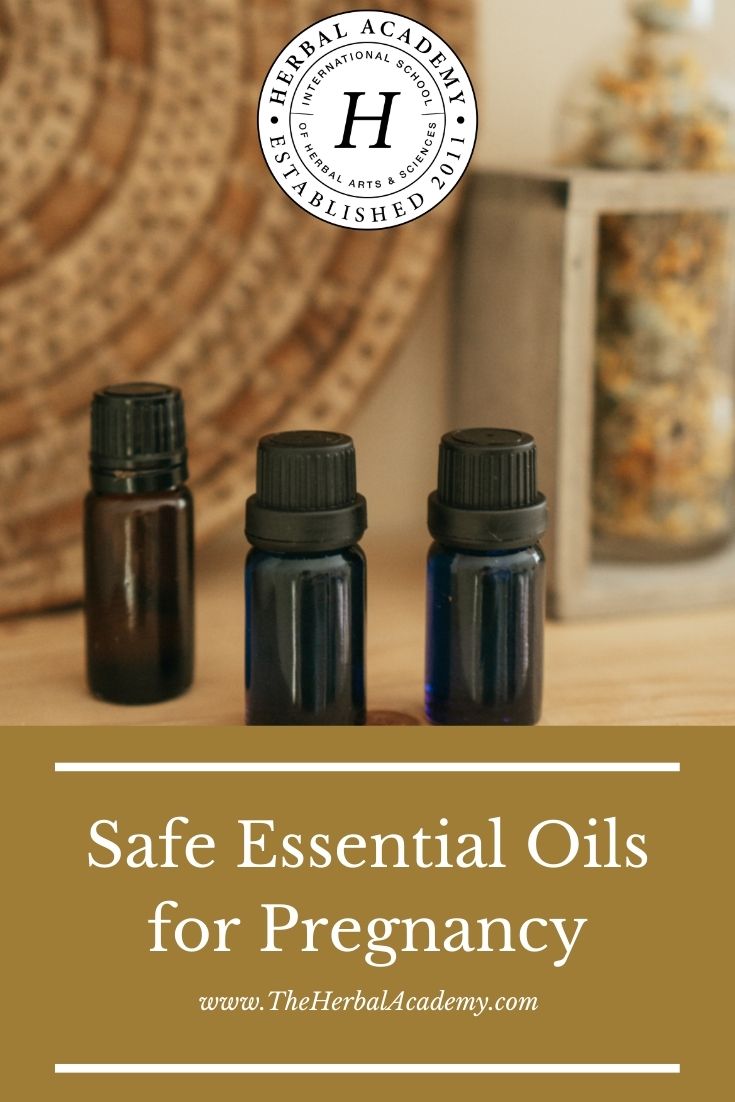
REFERENCES
Buckle, J. (2003). Clinical aromatherapy. Philadelphia, PA: Elsevier Science.
Cameron, E. L. (2014). Pregnancy and olfaction: a review. Frontiers in Psychology, 5, 67.
Christie, L. Deacon, S., Pickard, S., & Price, P. (2013). Pregnancy guidelines: Guidelines for aromatherapists working with pregnant clients. Retrieved from https://naha.org/assets/uploads/PregnancyGuidelines-Oct11.pdf
National Association for Holistic Aromatherapy (NAHA). (2021). Safety information. Retrieved from https://naha.org/explore-aromatherapy/safety#other
Tisserand, R., & Young, R. (2014). Essential oil safety (2nd ed.). Churchill Livingstone Elsevier.
Tisserand, R., & Balacs, T. (1995). Essential oil safety. New York, NY: Churchill Livingston.
Vora, R. V., Gupta, R., Mehta, M. J., Chaudhari, A. H., Pilani, A. P., & Patel, N. (2014). Pregnancy and skin. Journal of family medicine and primary care, 3(4), 318.









